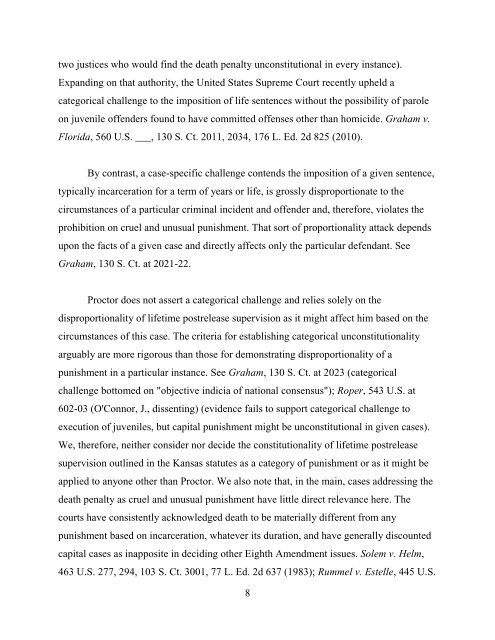State v. Proctor - Kansas Judicial Branch
State v. Proctor - Kansas Judicial Branch
State v. Proctor - Kansas Judicial Branch
Create successful ePaper yourself
Turn your PDF publications into a flip-book with our unique Google optimized e-Paper software.
two justices who would find the death penalty unconstitutional in every instance).<br />
Expanding on that authority, the United <strong>State</strong>s Supreme Court recently upheld a<br />
categorical challenge to the imposition of life sentences without the possibility of parole<br />
on juvenile offenders found to have committed offenses other than homicide. Graham v.<br />
Florida, 560 U.S. ___, 130 S. Ct. 2011, 2034, 176 L. Ed. 2d 825 (2010).<br />
By contrast, a case-specific challenge contends the imposition of a given sentence,<br />
typically incarceration for a term of years or life, is grossly disproportionate to the<br />
circumstances of a particular criminal incident and offender and, therefore, violates the<br />
prohibition on cruel and unusual punishment. That sort of proportionality attack depends<br />
upon the facts of a given case and directly affects only the particular defendant. See<br />
Graham, 130 S. Ct. at 2021-22.<br />
<strong>Proctor</strong> does not assert a categorical challenge and relies solely on the<br />
disproportionality of lifetime postrelease supervision as it might affect him based on the<br />
circumstances of this case. The criteria for establishing categorical unconstitutionality<br />
arguably are more rigorous than those for demonstrating disproportionality of a<br />
punishment in a particular instance. See Graham, 130 S. Ct. at 2023 (categorical<br />
challenge bottomed on "objective indicia of national consensus"); Roper, 543 U.S. at<br />
602-03 (O'Connor, J., dissenting) (evidence fails to support categorical challenge to<br />
execution of juveniles, but capital punishment might be unconstitutional in given cases).<br />
We, therefore, neither consider nor decide the constitutionality of lifetime postrelease<br />
supervision outlined in the <strong>Kansas</strong> statutes as a category of punishment or as it might be<br />
applied to anyone other than <strong>Proctor</strong>. We also note that, in the main, cases addressing the<br />
death penalty as cruel and unusual punishment have little direct relevance here. The<br />
courts have consistently acknowledged death to be materially different from any<br />
punishment based on incarceration, whatever its duration, and have generally discounted<br />
capital cases as inapposite in deciding other Eighth Amendment issues. Solem v. Helm,<br />
463 U.S. 277, 294, 103 S. Ct. 3001, 77 L. Ed. 2d 637 (1983); Rummel v. Estelle, 445 U.S.<br />
8

















